Headteacher Lynne Gavin – “Thank you to all the Action Tutoring volunteers on behalf of the children whose life chances are improving as a result of what they do.”
15 March 2019
Lynne Gavin is the headteacher of Pakeman Primary School in Islington, London. Approximately 70% of its pupils are living in poverty, another 15% considered working poor, 75% of children speaking English as an additional language and many children come from a refugee background. On 4th March, Lynne shared a powerful talk at the launch of Action Tutoring’s Impact Report in the Houses of Parliament about why her school is working with Action Tutoring and the difference it makes…
When I first arrived at Pakeman, I was constantly surprised that so many of the things that I took for granted were new to our children. For example, can you imagine rarely stepping outside of your local environment? Never having been to the cinema? Or being asked to write about the seaside if you have never seen the sea, paddled in the water and felt the sand beneath your feet?
The fact is that disadvantage is still determining destiny for far too many children. Life chances are being determined by the parents they are born to and the postcode they are born in. These children are no less capable or intelligent, but there are serious obstacles that need to be overcome in order for them to have the same life chances as their more affluent peers.
Being disadvantaged can significantly impact on a child’s ability to learn. These children may not have a solid foundation of good physical, mental and emotional health; they may lack good language and literacy development; they may not have the material and physical support systems that other children have.
But disadvantage is not just a label – it’s about lives. Our children’s lives. In our school, we have pupils growing up in families affected by drug and alcohol abuse, or with a parent in prison. We have children who are new to the country as refugees. We have children who are acting as young carers for parents with mental health issues, which means they aren’t always in school, or arrive hungry having not been fed breakfast. We have pupils living in temporary accommodation because they are fleeing situations of domestic violence and have seen things they should never have witnessed. Then there are the pupils whose parents want to help support their learning, but are hindered by their own poor literacy skills. Each child has a different story, a different need and often the odds are stacked against them.
Working together
We can turn things around for these children. Schools that serve disadvantaged children have to work hard to counteract the impact of disadvantage. We know it can be done – but we need the right resources and the right support. The more resources that a child has at their disposal, the better the chances of optimising learning and enabling them to experience success. Partnership working helps us to provide these additional resources and support. Action Tutoring is one of the partners that we work with. We introduced Action Tutoring last year and we have recently been successful in gaining funding from a foundation to continue partnering with them for another three years and to extend the project into nine other schools in the local area. As a result, more children are benefiting from this excellent support.
When something is working well, you get a buzz. You can feel it, you can see it and you can hear it! I can feel it. I was impressed with Action Tutoring from the moment they came into school to talk to me about the project.
- They care passionately about improving outcomes.
- They have high expectations.
- They are aspirational.
- They listen and want to improve what they are doing.
- They are reflective and thoughtful.
I continue to be impressed by the way that our lovely Action Tutoring Programme Executive, Emma, manages our sessions so beautifully each week, with great care and attention.
I can see the impact sessions are having every time I drop in. Tutors have good subject knowledge, provide clear explanations, they inspire the children and are great role models.
Children enjoy the sessions – there are high levels of engagement, motivation, interaction and encouragement, children are working hard and are being challenged. The children are proud of their work and happy to talk about their learning.
Finally, I can hear the impact. Here are some teachers’ comments:
“Tutors are dedicated, professional, well organised and knowledgeable.”
“Action Tutoring is an amazing resource and has had a clear and sustained impact. As well as moving the children on in reading and maths, we have seen a real improvement in some of the children’s focus and confidence. The children are making links between the work they do with their tutor and the work they do in class and this helps them be more independent and take ownership of their learning.”
Then here are some comments from the children themselves:
“I get help quicker in the sessions. In class there are more children, so I have to wait longer for help.”
“Because when I go home, I don’t get that much practice, so it helps me if I go to tutoring.”
“In Action Tutoring, I learn new things that I could not believe I could even do.”
“I would 100% recommend it to another pupil. If you don’t know something, your tutor will explain it to you. I want to show my tutor how much I’ve learnt.”
Champions
Our children need champions. Champions – who never give up on them, who understand the power of relationships and insist they become the best they can possibly be. That’s just what the volunteers from Action Tutoring are doing. They are making a difference by championing our children.
The volunteers are ordinary people who care enough to want to make a difference, who show the children that they believe in them. They are ordinary people who put their energies, resources and skills into helping the children meet their goals, experience success and reach their full potential.
But I’d like to finish by saying I am wrong. I am wrong about them being ordinary people. I think they are quite remarkable people. People who are prepared to give of themselves to make the lives of others better. I often think how wonderful it is to imagine our children moving on to lead happy and successful lives – all because the people around them helped to fight for them and to make a difference.
Nelson Mandela said, “education is the most powerful weapon which you can use to change the world.” These remarkable people are helping us to do just that. So, I’d like to thank them for that, thank them from the bottom of my heart on behalf of Pakeman and the other schools but most of all on behalf of the children whose life chances are improving as a result of what they do.
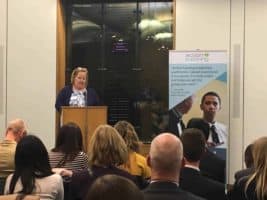
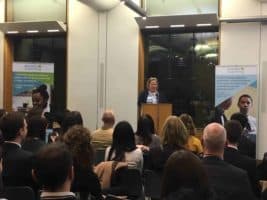
Headteacher Lynne Gavin speaking at the Action Tutoring Impact Launch Report.
“The attainment gap does not have to be inevitable.” Action Tutoring CEO reflects on the charity’s achievements and future impact
5 March 2019
My awareness of the difference targeted, extra support could make for pupils started at an early age. I had some tutoring at the end of primary school and I can still remember and picture my tutor, Mrs Shields, not least because as much as helping me grasp subject knowledge I was struggling with, she hugely improved my confidence and self-belief. Even at a young age I think I felt an awareness that those opportunities that were given to me shouldn’t just be available to those whose parents can afford them.
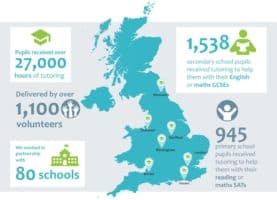 At the heart of Action Tutoring lies a desire to see every child reach their potential, regardless of their background. When Action Tutoring started, we looked heavily at the evidence base for targeted, well-structured tutoring programmes and have adapted our programme to include the elements that we know will help to contribute to the best possible impact from the tutoring. Last year, we were able to work with nearly 2,500 pupils in 80 schools across seven cities.
At the heart of Action Tutoring lies a desire to see every child reach their potential, regardless of their background. When Action Tutoring started, we looked heavily at the evidence base for targeted, well-structured tutoring programmes and have adapted our programme to include the elements that we know will help to contribute to the best possible impact from the tutoring. Last year, we were able to work with nearly 2,500 pupils in 80 schools across seven cities.
In the UK there is sadly a large gap in attainment between poorer and wealthier pupils, beginning in primary school and only widening at the secondary level, to reach a 27 percentage point difference in attainment in English and maths at GCSE. This isn’t because of a lack of ability and many other countries manage to achieve a much smaller attainment gap.
Tutoring can be an effective way to level the playing field, especially considering that 25% of pupils nationally and over 40% in London are now having private tutoring at some point. It’s a booming industry giving many a big advantage, but for the most part serving young people that are already doing well and not reaching those falling behind if their parents are unable to afford the support.
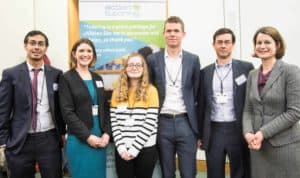 The evidence base for tutoring as an intervention to support pupils is strong, but last night we were excitingly able to celebrate that Action Tutoring’s own programme is working, at an event in Parliament to launch our 2017-18 Impact Report. The event was hosted by Helen Hayes, MP for Dulwich and West Norwood, who visited one of our programmes last year, and with guest speaker the Rt Hon Nick Gibb MP, Minister of State for School Standards.
The evidence base for tutoring as an intervention to support pupils is strong, but last night we were excitingly able to celebrate that Action Tutoring’s own programme is working, at an event in Parliament to launch our 2017-18 Impact Report. The event was hosted by Helen Hayes, MP for Dulwich and West Norwood, who visited one of our programmes last year, and with guest speaker the Rt Hon Nick Gibb MP, Minister of State for School Standards.
Welcoming over 100 guests representing our funders, partner schools, volunteer tutors, fellow charities and corporates, to the evening, Helen Hayes said, “the work [of Action Tutoring] plays a significant role in helping pupils to remain engaged in education for longer”, ultimately improving the life outcomes of the young people involved and bringing benefits to the wider economy and society.
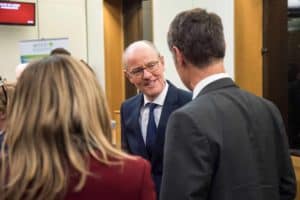 Nick Gibb commenting on our work said, “this Impact Report shows that it is possible to close the attainment gap and Action Tutoring has had huge success raising attainment. The pupils are proof that regardless of your circumstances it is possible to get crucial English and maths qualifications. Action Tutoring offers a practical, structured solution. Action Tutoring’s vision is one that I fully endorse.”
Nick Gibb commenting on our work said, “this Impact Report shows that it is possible to close the attainment gap and Action Tutoring has had huge success raising attainment. The pupils are proof that regardless of your circumstances it is possible to get crucial English and maths qualifications. Action Tutoring offers a practical, structured solution. Action Tutoring’s vision is one that I fully endorse.”
In addition to hearing from Helen and Nick, two pupils from the programme bravely shared the difference Action Tutoring has made to them in their studies, with Olivia, who is now studying for her A Levels and who plans to go to university saying, “Tutoring sessions create a comfortable environment that can help to boost your confidence. The tutors paid attention to what we were doing and would check if we understood everything. Tutoring offered me guidance and personal attention that I wouldn’t find in a school setting. I believe that Action Tutoring had the biggest impact on my life.”
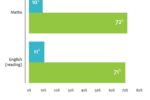 Our impact report shows that on our primary programme last year, just 10% of our pupils, 90% of whom were eligible for Pupil Premium funding, were working at national standard when they started our programme, but after just two terms of tutoring over 70% achieved this benchmark, setting them on a strong trajectory to achieve at secondary school and beyond.
Our impact report shows that on our primary programme last year, just 10% of our pupils, 90% of whom were eligible for Pupil Premium funding, were working at national standard when they started our programme, but after just two terms of tutoring over 70% achieved this benchmark, setting them on a strong trajectory to achieve at secondary school and beyond.
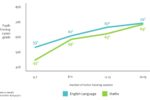 At secondary level, after just two terms of tutoring our pupils, who come from disadvantaged backgrounds and are considered at risk of not reaching national standard, were able to match the national pass rate for all pupils in English and maths, regardless of background. Achieving this crucial benchmark will significantly improve their chances of progressing into further education, employment or training, opening up paths to them that would otherwise be closed.
At secondary level, after just two terms of tutoring our pupils, who come from disadvantaged backgrounds and are considered at risk of not reaching national standard, were able to match the national pass rate for all pupils in English and maths, regardless of background. Achieving this crucial benchmark will significantly improve their chances of progressing into further education, employment or training, opening up paths to them that would otherwise be closed.
Our pupils face considerable challenges in their lives and I am constantly impressed at their resilience and willingness to attend tutoring sessions outside of school hours. Last week I visited one of our partner primary schools in South London. The head pointed to a small group of four pupils all on the Action Tutoring programme. He explained that of the four, one comes from a single parent family with that parent dying of cancer, another is being bought up by an elderly carer instead of her parents, one is a looked after child and the fourth lives with her mother who is very committed to her daughter’s education but is sadly herself completely illiterate. When we talk about disadvantage, these are the real challenges these pupils face. Helping them make progress against the circumstances they face isn’t easy or straight forward, but it is possible, and these pupils deserve all the help we can give them.
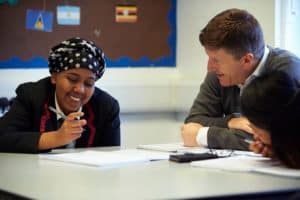 Looking at the bigger picture, there are reports that currently say in the UK it could take 70 years or more to close the attainment gap, but I don’t believe it has to be that way and our results point to that. We recently carried out a freedom of information request that looked at how many disadvantaged pupils pass either their maths or English GCSE, but not both. Analysis from this with our partner Impetus-PEF further showed that if the 19,000 disadvantaged pupils passing in one subject could be supported to achieve in both, then the attainment gap would in fact be halved. To put it in perspective, 19,000 is fewer than six pupils per school, or to put it another way, fewer than the total number of secondary school pupils in Manchester alone. The attainment gap does not have to be inevitable.
Looking at the bigger picture, there are reports that currently say in the UK it could take 70 years or more to close the attainment gap, but I don’t believe it has to be that way and our results point to that. We recently carried out a freedom of information request that looked at how many disadvantaged pupils pass either their maths or English GCSE, but not both. Analysis from this with our partner Impetus-PEF further showed that if the 19,000 disadvantaged pupils passing in one subject could be supported to achieve in both, then the attainment gap would in fact be halved. To put it in perspective, 19,000 is fewer than six pupils per school, or to put it another way, fewer than the total number of secondary school pupils in Manchester alone. The attainment gap does not have to be inevitable.
Action Tutoring has ambitious plans to continue to grow, especially outside of London where the attainment gap is even larger. Autumn 2017 saw us launch in our seventh city, Newcastle, and this autumn we are aiming to launch in our eighth, Nottingham. Alongside this, we’ll continue to expand our growing primary programme and deepen our reach in current areas of operation. Last night was a fantastic opportunity to celebrate all that’s been achieved so far, right in the heart of government, and we look forward continuing to ensure our programme is as high quality and impactful as possible, to benefit even more young lives.



